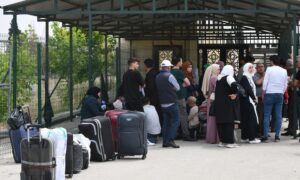International day of revival of genocide and impunity of perpetrators


Mansour Omari | On December 9 each year, the United Nations celebrates the “International Day of Commemoration and Dignity of the Victims of the Crime of Genocide and of the Prevention of this Crime”. The United Nations chose this day in 2015, as it marks the anniversary of the adoption of the “the Convention on the Prevention and Punishment of the Crime of Genocide” in 1948, the wake of the Holocaust by Nazi Germany before and during World War II, which murdered nearly six million Jews.
Today, 72 years after the Convention, the world has not learned the lessons of the past, and crimes of Genocide are still being committed without accountability or justice for the victims, while the great powers turn the dignity of victims and punishment of the perpetrators into political cards, strengthening the power of perpetrators.
While the United Nations and countries around the world celebrate this day, Myanmar (Burma) and China are commemorating Genocide crimes in their own way, against Muslims in the midst of international and Islamic silence and inaction. The international revival of these crimes also includes the breach of international commitments by the great powers, and the indifference to holding the ISIS members who committed the Yazidi genocide to justice. Insulting the victims and their dignity by turning their case into a political card will give the opportunity to infamous criminals to manipulate it.
The European Union, and Britain are failing to make efforts to hold the perpetrators of Yazidi genocide to account, and they are trying to outsource their problems to countries such as Iraq and to ruling groups such as the Kurdish Autonomy in Syria. But those are countries and groups that need support and help in ending their own violations of human rights, not to build up obligations above their shoulders that are already exhausted, by wars and uprisings.
French President Emmanuel Macron says that ISIS members are not the main problem in Syria, but he ignores the fact that they committed the Yezidi genocide, while the US President Trump turns the talk on the perpetrators of the genocide into a joke: “Would you like some nice ISIS fighters? I can give them to you”. The European Union and Britain also refuse to take back their ISIS citizens, blocking possibilities for holding the perpetrators accountable and justice for the victims.
Punishment for this crime also turned into a political card manipulated by criminals who committed mass atrocities such as Bashar al-Assad, who offered holding ISIS accountable for its crimes in his courts, in an attempt to gain more cards to bargain with Europe for the rehabilitation of his murderous regime, though he was one of the creators of ISIS, by releasing some of the most notorious terrorists from his prisons, supporting ISIS financially by working with them, as well as fighting the factions that were fighting ISIS. Assad said in his interview with French magazine Paris Match that “French or foreign terrorists will be subject to Syrian law”. In a message to France and EU through a French media that helped him in doing so, by using this statement as a title. While the United States is not giving enough efforts to providing justice to victims of the Yazidi genocide, and leading a crude pragmatic policy in Syria.
The responsibility of holding ISIS criminals accountable to the Yazidi genocide remains a leaf blown by winds of states interests and political bargaining that do not prioritize providing justice to victims and punishing the perpetrators.
The international community negligence in punishing the perpetrators of genocide violates their commitments in Article 1 of the Convention on the Prevention and Punishment of the Crime of Genocide: “The Contracting Parties confirm that genocide, whether committed in time of peace or in time of war, is a crime under international law which they undertake to prevent and to punish.”
The United Nations says on its website:
The United Nations observes designated days, each with a theme. By creating special observances, the United Nations promotes international awareness and action on these issues.
The lack of commitment by the United Nations to promote awareness of people about genocide, including about the abandonment of responsibilities and pledges by the great powers, makes the celebration of this day a pure hypocrisy, and an act contrary to the UN announced purposes and obligations of states in their conventions. While the facts on ground flips this day into a day of reviving Genocide, empowering the perpetrators and insulting the dignity of the victims.
The super powers should shoulder their international responsibilities and commitments by punishing the perpetrators and compensating the victims, not evading them and exporting their commitments to areas that will exacerbate the suffering of the victims and enhance the power of the criminals.
if you think the article contain wrong information or you have additional details Send Correction
-
Follow us :
Most viewed
- Accompanied his brother to Turkey and Saudi Arabia: Who is Hazem al-Sharaa?
- Russia shows willingness to support Syria's reconstruction
- Kurdish National Council withdraws from Syrian Coalition
- Syrian Ministry of Information prohibits interviews with figures of previous regime
- Suspicions of regional influence behind recent Islamic State activity in Syria

















 A
A
A
A
A
A






 More Opinion
More Opinion